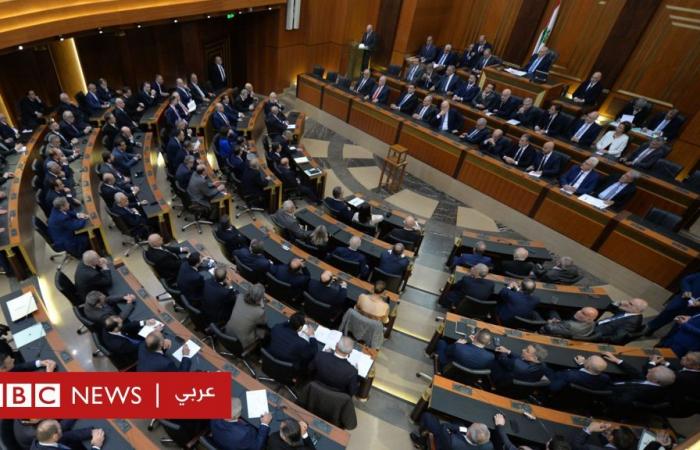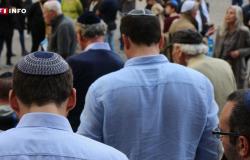
image source, EPA
1 hour ago
The Lebanese Parliament witnessed an intense debate during the election of the country’s president, according to what was confirmed by the official Lebanese News Agency.
The agency reported that the parliamentary session to elect the 14th President of the Republic began after a quorum was reached.
She indicated that the session was held in the presence of French presidential envoy Jean-Yves Le Drian, Saudi envoy Yazid bin Farhan, ambassadors of the Five-Year Committee and a number of diplomats.
The agency reported the interventions of a number of representatives within the Council, after reading constitutional articles and other articles from the Council’s bylaws regarding the election.
It quoted MP Melhem Khalaf in his intervention as saying: “In order to preserve the republic and adhere to democracy, I sincerely call on you not to violate the constitution and to go towards a state of truth and law.”
Meanwhile, Representative Gebran Bassil said, “What we have seen in the past days indicates that we have returned to the era of consuls and instructions that came from abroad to a number of representatives, and positions followed in support of a specific candidate. This indicates that we are facing an appointment process, which puts us before a big question: Is the Council willing to give up the appointment?” Exercising sovereignty through new external guardianship?”, according to the Lebanese News Agency.
Meanwhile, Representative Jamil Al-Sayyed opposed the election of a “constitutionally unqualified” president, pointing out that “he was not subjected to any pressure from anyone to force the election of any candidate.”
Representative Paula Yacoubian made an intervention in which she indicated that “the Lebanese political class does not want a president capable of doing anything,” which led to a sharp debate between her and Representative Salim Aoun, according to the Lebanese News Agency.
Today, the Lebanese Parliament began a session to elect a President of the Republic, which is supposed to end a presidential vacancy that has lasted for more than two years.
Since the end of the term of former Lebanese President Michel Aoun in October 2022, Parliament has not succeeded in electing a president for the country in 12 sessions.
The Lebanese opposition forces announced their agreement to elect the Commander of the Lebanese Army, Joseph Aoun, as President of the Republic.
This came in a statement issued by a meeting of opposition representatives at the headquarters of the Lebanese Forces Party.
Agence France-Presse quoted analysts as saying, “The role required of the army in the next phase to implement a ceasefire between Israel and Hezbollah constituted a decisive element in tipping the balance in favor of Joseph Aoun.”
-On Wednesday, Suleiman Franjieh announced his withdrawal in favor of the army commander, and meetings and consultations between the political forces intensified in the last hour with the aim of reaching a “consensus” regarding the army commander.

image source, Reuters
Since the beginning of the week, the American envoy to Beirut, Amos Hockstein, the Saudi envoy, Yazid Al Farhan, and the French envoy, Jean-Yves Le Drian, have held separate meetings with various representatives and political figures in Lebanon.
On Wednesday, Lebanese Prime Minister Najib Mikati expressed his hope for an agreement on a new president of the republic, saying: “For the first time, since the vacuum in the presidency, I feel happy because, God willing, we will have a new president of the republic.”
Aoun needs a constitutional amendment, if he is elected, to become president, as the constitution does not allow the election of first-class employees while they are in office and up to two years after their resignation or referral to retirement.
In the first round of elections, the candidate needs a two-thirds majority of votes, or eighty-six votes out of one hundred and twenty-eight votes, to win. If a second round is held, the required majority is an absolute majority, meaning sixty-five votes.
If Joseph Aoun is elected, he will be the fourth former army commander to assume the presidency of the republic in Lebanon, after the Taif Agreement in 1990.
The matter is not a mere coincidence, given that both positions are occupied by a Maronite Christian, according to custom.
But the current circumstance increases the symbolism of the army commander’s arrival to the presidency. Today, Lebanon is under the American microscope regarding the implementation of the cessation of hostilities agreement between Hezbollah and Israel, and there is great reliance on the army’s role in doing so.
The current army commander, Joseph Aoun, is considered one of the figures who has close relations with the Americans, who praise the role of the army and what it is doing so far within the framework of implementing the agreement.
The United States is considered the most prominent supporter of the Lebanese Army, and is the party that provides it with the greatest aid, despite the small total volume of this aid and not including any specific weapons. It also contributed in a previous stage to subsidizing the wages of its members.
The American presidential envoy, Amos Hochstein, who visited Lebanon at the beginning of the week, was quoted as saying that Joseph Aoun possesses the specifications required in the next stage, although he is not the only one with these specifications.
It also comes from an institution that is seen as inclusive, patriotic, above political divisions, and untainted by accusations of corruption.





